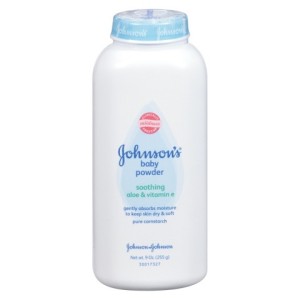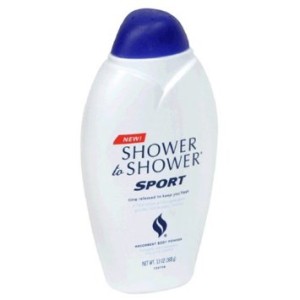Talcum Powder / Ovarian Cancer
The Risks of Talcum Powder
Every year, there are over 2,000 people diagnosed with ovarian cancer after regularly using some form of talcum powder. While talc is very efficient at moisture absorption, it is no secret that the finely ground talc present in various baby and body powders has the potential to harm its users.
In particular, talcum powder used by women on the genital area can sometimes work its way into the woman’s body and greatly increase the likelihood of developing ovarian cancer. Talc particles enter the vagina, move through the uterus and fallopian tubes, and finally reach the ovaries where they cause the tissues to fester and turn cancerous.
In a recently decided personal injury case, Johnson & Johnson was found guilty of marketing talcum powder that they knew increased the risk of ovarian cancer without adequate warning labels on the packaging. Those who have contracted ovarian cancer after using Johnson & Johnson talc-containing products have a right to seek compensation for their loss.
Talc’s Association With Ovarian Cancer
Many studies have found a connection between talcum powder use and ovarian cancer. Cancer Prevention Research, for example, a widely respected journal dedicated to finding ways to reduce cancer risks, recently published a study confirming that lifelong use of talcum powder increases the risks of ovarian cancer. The study documents how talc particles that reach the ovaries can lodge there, cause irritation, and lead to cancer cell formation. Once it has a foothold in the ovaries, the cancer can spread to other parts of the body.
Ovarian cancer begins very “silently.” Part of its deadliness stems from its early symptoms being very hard to detect. In fact, it often takes three or four diagnoses to identify it. By the time a woman is diagnosed with ovarian cancer, the cancer may already have spread to the abdomen and pelvis. By that time, it may have begun to cause noticeable symptoms like chronic fatigue, bladder/bowel irregularities, bloating, and abdominal pains.
Every single year, some 20,000 new cases of ovarian cancer are discovered, and around 14,000 die of this dread disease. The chances of getting ovarian cancer for women is around one out of 70, but regular talc use increases the odds to one in 50. Alarmingly, it can reasonably be concluded that use of talcum powder on the genitalia is responsible for the deaths of 1,500 women per year.
Johnson & Johnson Talc Litigation
On February 22nd, 2016, the City of St. Louis Circuit Court ruled that the ovarian cancer of Jacqueline Fox had been caused by use of Johnson & Johnson talcum powder. Miss Fox died of ovarian cancer in late 2015 after using talcum powder for over 35 years. The court gave her family a $72 million settlement. Ten million dollars was allotted for the family’s losses, while the remaining $62 million were punitive damages.
This is not the first time Johnson & Johnson has lost in court on the issue of liability for this product. In 2013, a jury in South Dakota ruled that Johnson & Johnson failed to place sufficient warning labels on their talc-containing products concerning the increased risks of ovarian cancer. In that case, Plaintiff Deane Berg had developed ovarian cancer in 2006, and talc was found on her ovaries by skilled physicians using an electron microscope. Despite these findings and the court’s ruling, Johnson & Johnson did not place the appropriate warning labels on their talcum powders.
Contact Us Today for Help
If you or a loved one have been harmed by regular use of Johnson & Johnson or another brand of talcum powder, we at the Law Offices of Ronald B. Laba are here to help. We understand the effects that talc can have, which sometimes lead to ovarian cancer, and we know how to fight for and win maximum compensation for all losses you have sustained.
Contact Attorney Ron Laba today at 800-490-2222 for a free, hour-long case consultation. There is no obligation, and we are here to assist you with expert legal advice on a 24/7 basis.
TALCUM POWDER – OVARIAN CANCER – FREQUENTLY ASKED QUESTIONS
Q: Is there an association between talcum powder and ovarian cancer?
A: Yes. Many studies have found a connection between talcum powder use and ovarian cancer. Cancer Prevention Research, for example, a widely respected journal dedicated to finding ways to reduce cancer risks, recently published a study confirming that lifelong use of talcum powder increases the risks of ovarian cancer. The study documents how talc particles that reach the ovaries can lodge there, cause irritation, and lead to cancer cell formation.
Q: Who is this case against?
A: This is a case against the manufacturer of the talcum powder product. In most cases, that will be Johnson & Johnson, manufacturer of Shower to Shower body powder and Johnson’s Baby Powder.
Q: Is my Doctor or Hospital going to be brought into the case?
A: No, this is not a case against any doctors, hospitals, pharmacies or any other health care provider. We believe fault lies solely with the manufacturer of the product.
Q: Will I owe any fees or costs if I don’t win my case?
A: No, if you don’t win, you don’t pay. We only get paid if we successfully settle your case for an amount approved by you in writing in advance. Thus, if we take your case, you can have a peace of mind knowing that we have a reasonable expectation of success.
Q: Is this a class action case?
No. We do not favor class actions for our injured clients. A class action is essentially a large group of plaintiffs, known collectively as “the class”. The class is represented by a class representative, who stands for the rest of the class. This means that all members of the class are treated as one plaintiff, not separately.
Instead, we file cases individually or in a “mass tort” action. Clients still achieve strength in numbers by joining together against a common defendant but they do not lose their right to be treated as individuals. This is important because every case is different and each person’s own set of facts and circumstances needs to be taken into account in order to understand the true nature and extent of their damages. We believe this kind of approach is necessary in order to achieve maximum payment on the case.
Q: Have there been any recent verdicts against Johnson & Johnson for talcum powder induced ovarian cancer?
A: Yes, On February 22, 2016 a St. Louis jury found Johnson & Johnson liable for the development of Plaintiff Jacqueline Fox’s ovarian cancer and awarded her family a verdict of $72 million. Ms. Fox passed away from ovarian cancer in October 2015. The verdict includes $10 million in actual compensatory damages and $62 million in punitive damages. The family was represented by members of our trial team/ Beasley, Allen, Crow, Methvin, Portis & Miles, PC.
This is the first time a jury has ordered Johnson & Johnson to pay damages over these claims, but it is not the first time that the company has been handed a guilty verdict. J & J was found liable in a 2013 case where the jury found in favor of Plaintiff Deane Berg on her claim that J&J did not adequately warn consumers of the link between talc and ovarian cancer.
Ms. Berg was diagnosed with ovarian cancer in 2006. Her cancerous tissue was examined by three doctors using a scanning electron microscope. The physicians discovered talc on her ovaries, concluding the talcum particles were able to migrate through the vagina uterus and fallopian tubes to the ovaries. When the ovaries became inflamed from talcum particles, the growth of cancer cells began.
Even after this litigation, Johnson and Johnson refused to add warning labels to its talc products. RBL
Q: Who can I call if I would like more information?
A: Feel free to call us at 1-800-490-2222. Our job is to make sure all of your questions are answered fully and completely.
Law Offices of Ronald B. Laba, APC
www.drug-injury-lawyer.com



